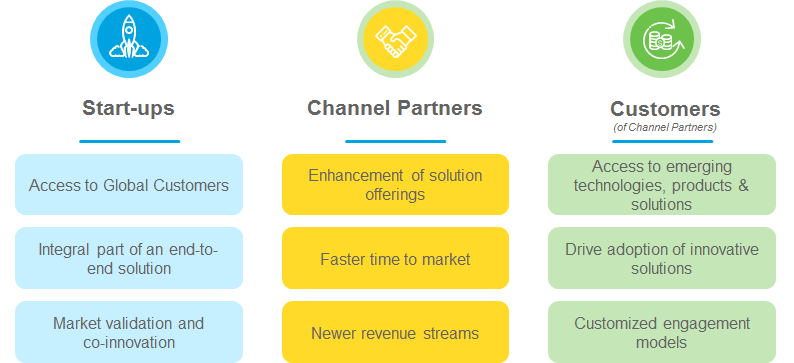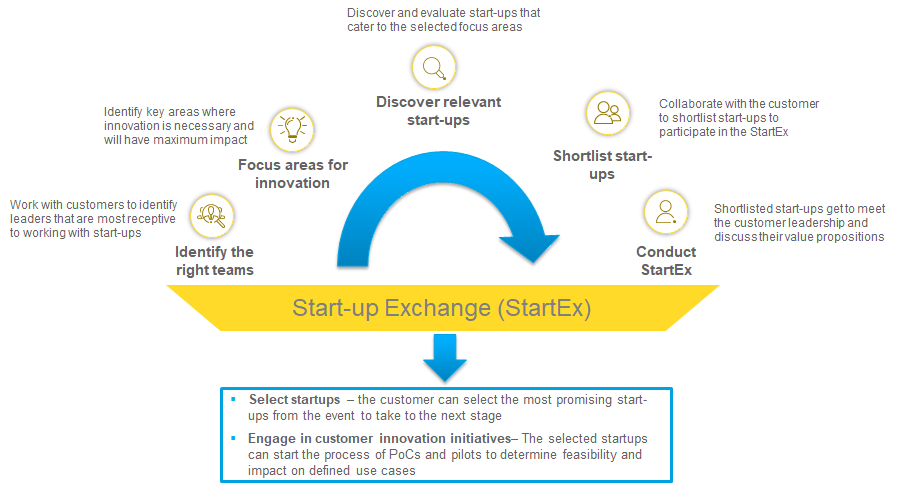Enterprise tech: How to achieve results as a go-to-market partner for start-ups?
While traditionally, service providers have been acting as go-to-market partners for large product and tech companies, they are now also playing that role for start-ups. This allows service providers to keep pace with the constant innovation in enterprise software.
This blog explores the need for channel partnerships with start-ups, process related challenges and possible tactical approaches to address these challenges in a collaborative manner.
Key drivers for channel partnerships
One of the major roadblocks for early stage enterprise software start-ups willing to scale is the lack of resources and the high cost necessary to access and acquire large customers, from lead generation to implementation. Additionally, large enterprises are now buying from a wide range of partners/vendors. There is also an increasing reluctance for purchasing sophisticated products that will require significant services to integrate, maintain and train their staff.
On their end, large service providers have legacy partnerships at multiple levels with same global customers, managing all or part of their IT and applications infrastructure and services across multiple geographies. Therefore, service providers act as a natural entry point for start-ups looking to ramp up their enterprise IT sales with large deals. On some occasions, clients ask the start-ups and the service providers to collaborate to ensure seamless integration of the start-ups’ products into the customers’ environment. At times, this becomes a key factor in triggering start-ups' decision to build a channel partner ecosystem.
Finally, start-ups choose to partner with large service providers because they can benefit from the technical expertise of the service providers’ practice teams. The process enables them to get the required validation on their products and its suitability for enterprise environments. They can also leverage their partners’ innovation teams for internal evangelization, relevant introductions and marketing activities.
For service providers, this gives an opportunity to establish partnerships with relevant start-ups offering niche innovative solutions that can eventually be scaled for different customers across various industries, leading to mutual benefits. Service providers can leverage this opportunity by integrating start-ups’ solutions in their offerings and providing services on top of the software or product developed by partners. This provides them an edge in terms of their ability to offer differentiation to their customers, and since the service providers do not always need to build capabilities in-house, they can accelerate their time to market.

Benefits of Channel Partnership
Challenges in making partnerships work
There are definite distinctions in the way large corporations and start-ups operate; leading to a mismatch in expectations on the two sides as both partners work out the practicalities of a partnership.
The first challenge that start-ups generally encounter in a partnership is the size and scale of a partner organization. Navigating the organizational structure, identifying the right stakeholders that would take the product to market and determining relevant use cases require patience and persistence. It is all the more true that the first success in this type of partnership would typically take a long time and contrasts with the fast-paced environment start-ups are usually used to. For example, while dealing with large accounts, we have observed cases in which their interest levels dip over time due to other priorities, leading to poor traction and lost momentum.
Secondly, start-ups expect more face time with customers than channel partners are sometimes able to offer, as it is often the quickest and most impactful way to demonstrate their value. No one else can articulate a start-up's value proposition better than a founder. Indeed, approaching this process in a sequential manner in which the service provider first sources requirements from its customers and subsequently involves start-ups if they can help address these requirements, exposes the service provider to information loss and misunderstandings and slows down the entire process. The limited exposure creates ambiguity on the start-up side as they are not able to understand the real needs or intent of the customer with respect to the bigger picture.
Lastly, another challenge, which is also fairly typical in large organizations, is the time it takes to go through the internal processes and necessary approvals for administrative, procurement and legal formalities, including partnership agreements, purchase orders, contracts, incentive structure etc.
How we work towards solving them?
In our experience, having a dedicated innovation team that can navigate the organizational structure and build a breadth of connections with business units and delivery teams is crucial to the success of the relationship between service providers and start-ups. The ability of this team to influence multiple internal stakeholders that can then evangelize start-ups' solutions on their own is very important to drive a given partnership forward and eventually achieve scale. In order to do so, we have structured our team with Alliance Managers that can anchor relationships with specific start-up partners, incubate the partnerships and guide them along the entire journey as they are able to understand both the start-ups' perspectives and corporate needs. Setting up regular touchpoints with all the relevant stakeholders has also proven to be particularly helpful for maintaining partnership momentum. Last, but not the least, we measure ourselves on outcomes for start-ups and not solely on internal successes.
In addition, one of our key partnership drivers is the Start-up Exchange program (StartEx). The idea is to put start-ups directly in front of our customers and altogether look for opportunities to co-innovate. We strongly believe that this is a critical step in establishing successful partnerships between us, our customers and the start-ups. Therefore, we have been proactively looking for opportunities to work in a tight-knit circle involving all parties simultaneously. Having a start-up founder pitch his/her solution to senior leaders of Fortune 1000 companies with our support in the room creates an impact and is the best way to demonstrate commitment and mutual trust. It is also a fantastic opportunity to understand our customers’ problems from the discussions that follow. In some cases, it has taken only about four to six weeks from the initial StartEx to a paid Proof of Concept (PoC) run within the customer’s IT environment, drastically accelerating a process that can sometimes drag on for months. We even recently completed a paid PoC with a start-up partner for a prospective customer, a clothing retailer, off the back of a StartEx curated for this client’s visit few weeks prior.

Start-up Exchange program
Finally, we are constantly working towards simplifying procurement, legal and administrative processes for start-ups. We have standard mutual Non-Disclosure Agreements (NDA) and partnership agreement templates that can be used as soon as in-depth discussions start. Dedicated support staff is available within procurement and legal teams to address issues, if any. We have also recently started working on building an enterprise grade Cloud collaboration platform that will act as a self-service marketplace and enable seamless collaboration between start-ups, internal stakeholders and our extended ecosystem of partners and customers.
Overall, even though we are still early on in our channel partner journey for early and mid-stage enterprise tech start-ups, we always look to maintain a feedback loop with our partners in order to learn from our mistakes and to improve.
To date, we have built partnerships with 50+ enterprise tech start-ups through our Open Innovation initiative and have invested in 14 other start-ups through Wipro Ventures, our strategic investment arm. Our partners are typically early to mid-stage who are looking to accelerate their scaling process.
For more information on how start-ups and corporates can collaborate successfully, check out our report Open Innovation for the new world of tomorrow.
Industry :

Constance Fourquet-Mittal
Constance is currently working with the Open Innovation team within the CTO Office and is part of the Global 100 leadership program at Wipro. She recently graduated from her MBA at London Business School. She has experience in finance and strategy and has worked with both large corporates and start-ups in many different countries.

Ramanan Sambukumar
Ramanan is the head of the Open Innovation team within the CTO Office at Wipro and is also part of Wipro Ventures. He has a successful track record in making innovation work for enterprises. He has more than 16 years of consulting and industry experience working across different phases of business, from start-up to turnaround, with end-to-end responsibilities from customer acquisition, pre-sales, delivery/competency to P&L.